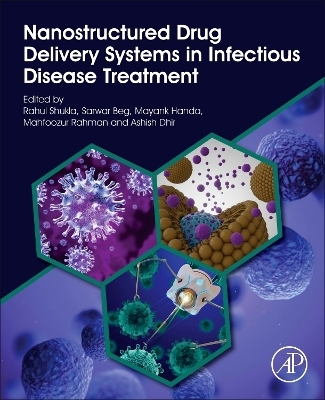
Nanostructured Drug Delivery Systems in Infectious Disease Treatment
Academic Press Inc (Verlag)
978-0-443-13337-4 (ISBN)
Sarwar Beg, PhD is currently serving as AMS-DBT Newton International Fellow at University of Central Lancashire, UK, and working in the area of glioblastoma research using targeted nanomedicines. He is also serving as the Assistant Professor at Department of Pharmaceutics, School of Pharmaceutical Education and Research, Jamia Hamdard, New Delhi. He has over a decade of teaching and research experience in the field of pharmaceutics and biopharmaceutics, especially in the development of novel and nanostructured drug delivery systems using Quality-by-Design paradigms with core expertise in computational pharmaceutics, experimental designs and multivariate statistical techniques. He has authored over 200 publications, 60 book chapters, 15 books, 03 Indian patent applications and H-Index of 40 with over 5400 citations to his credit. Dr. Rahul Shukla is currently working as an Assistant Professor (Contract) at Department of Pharmaceutics, NIPER Raebareli, India, He has a PhD in Pharmaceutical Sciences from CSIR CDRI and J.N.U New Delhi, India, an M.Pharm from IIT BHU,Varanasi, India and B.Pharm from Jamia Hamdard, New Delhi. He has more than ten years of research and academic experience with more than 30 publications and 10 book chapters to his credit. He has filed 7 Indian Patent and 1 Copyright. Recently he has edited a book on the Role of Novel Drug Delivery Vehicles in Nanobiomedicine. His current research interests include targeted drug delivery systems, particle engineering, controlled delivery for neurodegenerative diseases, dendrimer mediated drug delivery, solubilization and bioavailability enhancements. Mr. Mayank Handa, has completed his B. Pharm and M. Pharm from U.I.P.S, Panjab University, Chandigarh India. Currently, pursuing as Ph.D. at National Institute of Pharmaceutical Education and Research-Raebareli, Lucknow UP. His past industrial experience includes working at Eisai India Limited, India and Themis Medicare Limited, India. He has more than 20 peer reviewed publications in journals international repute and 10 book chapter. He has filed 5 Indian patent and 1 Copyright. His research interests in polymeric nanoparticles and emulsion based drug delivery, targeted drug delivery systems, Intranasal and transdermal drug delivery. Mahfoozur Rahman is an Assistant Professor at the Department of Pharmaceutical Sciences, Faculty of Health Science, Sam Higginbottom University of Agriculture, Technology & Sciences (SHUATS), Allahabad, India. He has authored more than 130 publications in peer-reviewed journals, 30 book chapters, seven books, and four articles in international magazines with various publishers. He has a Google Scholar h-index of 27 and over 1700 citations to his credit. He also serves on the editorial boards and as guest editor for several journals. He has received travel grants from various international congresses, such as IAPRD, MDS, Nano Today, KSN and WCN, on the basis of his research work and contribution in the field. Dr. Ashish Dhir is an Associate Principal Scientist in Drug Discovery for Merck in New Jersey. He was previously a Senior Scientist in the Department of Neurology, School of Medicine, University of California, Davis in Sacramento. He received his doctorate in Pharmacology from Panjab University, Chandigarh, India. He has over 15 years of experience in preclinical research in the field of neurological and neuropsychiatric disorders. Dr. Dhir's research entails establishing and validating animal models of various disease conditions, as well as investigating novel drugs and targets for disease treatment. Dr. Dhir has over 90 peer-reviewed journal papers and serves as an ad hoc reviewer and on the Editorial Board of several prestigious journals. He was recently named to the list of the world's top 2% pharmacology scientists (ranking 1053 out of 94611). Dr. Dhir has received numerous honors, including the Rafaelsen Young Investigator Award from the Collegium International Neuropsychopharmacologicum (CINP).
1. Introduction to infectious diseases and its global burden 2. Impact assessment of virus globally: Special emphasis on COVID-19, Zika and Ebola virus 3. Nano combinatorial therapies for infectious disorders 4. Stimuli responsive nanotechnological advancements in infectious disorders 5. Application of nanotechnology-based therapy against malaria 6. Therapeutic potential of nano assisted delivery in tuberculosis and its management 7. Exploration of advanced therapeutics for lymphatic and cutaneous leishmania 8. Nanotechnological driven chemotherapy for treatment of fungal infections 9. Nanoantibiotics driven approaches as advanced therapy for bacterial infections and chemotherapeutic resistance 10. Role of biotechnology as theranostic tool in infectious diseases 11. Nanovesicles as advanced tool against infectious diseases 12. Role of nanotechnology derived natural product as potential therapeutics against infectious diseases 13. Nanovaccines as futuristic tool to eradicate infectious diseases 14. Nanotechnology and resistance against biofilm 15. Nanotherapeutics in counteracting brain infection 16. Nanomedicine in infectious disorders: Challenges and regulatory concerns
| Erscheinungsdatum | 28.09.2024 |
|---|---|
| Verlagsort | San Diego |
| Sprache | englisch |
| Maße | 191 x 235 mm |
| Gewicht | 450 g |
| Themenwelt | Medizin / Pharmazie ► Medizinische Fachgebiete ► Onkologie |
| Studium ► Querschnittsbereiche ► Infektiologie / Immunologie | |
| Naturwissenschaften ► Biologie ► Mikrobiologie / Immunologie | |
| Technik ► Umwelttechnik / Biotechnologie | |
| ISBN-10 | 0-443-13337-9 / 0443133379 |
| ISBN-13 | 978-0-443-13337-4 / 9780443133374 |
| Zustand | Neuware |
| Informationen gemäß Produktsicherheitsverordnung (GPSR) | |
| Haben Sie eine Frage zum Produkt? |
aus dem Bereich


